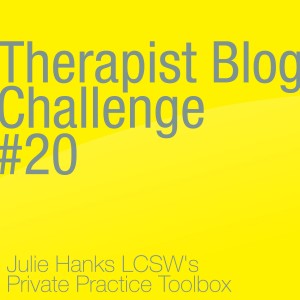I recently had the opportunity to interview Nicole Bonsol, a writing, branding, and graphic designer for healers. She helps therapists create an inviting and powerful website and best craft their message to engage with their viewers. I was fascinated at what Nicole had to say, especially because of her unique role in the process of helping clinicians reach their audience. Here are some highlights of our discussion:
Therapist Blog Challenge #21: Maintaining Space in a Relationship
 I'm excited to present a blog challenge that has to do with one of my favorite topics: relationships. Specifically, you'll have the chance to explore the idea of how a person can maintain his/her own space (physically and emotionally) while also being in a relationship.
I'm excited to present a blog challenge that has to do with one of my favorite topics: relationships. Specifically, you'll have the chance to explore the idea of how a person can maintain his/her own space (physically and emotionally) while also being in a relationship.
[Headline] Come up with a headline to give your readers an idea of what is to come. Here are a few examples:
"'Give Me Some Space!' Maintaining Healthy Boundaries in Relationships"
"Creating an Appropriate Amount of (Emotional) Space With Your Significant Other"
"Absence Makes The Heart Grow Fonder; How Spending Time Away From Your Spouse Can Strengthen Your Connection"
"Preserve Your Relationship By Taking Time For Yourself!"
[Strong Intro] Write an introductory paragraph to explain the topic more and lay the scene for your main points. You may write your own or use the following:
Movies and pop culture often portray two people in love as inseparable and completely enamored with one another. Some struggle when they realize that the experience of real life can be quite different. The truth is that almost everyone in a relationship needs a little personal space and even time away. But how can you get a breather while still maintaining your relationship? Here are some reasons why space is important and also ways to create boundaries and still keep your connection strong:
[Scanable Content] Break up your content to make it more digestible and easy to read. Under each point, flesh out your idea by elaborating on your thoughts.
1. Tune In To Your Feelings
Acknowledging your emotions that you need a little space in your relationship is the first step. Maybe you're feeling a bit cut off from other people or are even feeling a bit smothered. Some may be inclined to ignore such feelings or consider them "bad," but instead express to yourself if you are wanting a bit of a breather from your significant other.
2. Communicate About Your Needs
It may be a bit tricky, but tactfully communicate that you would like to branch out a bit. Be careful to let the other person know that you are not ending the relationship, but just want to find ways to enrich your life and experience. Express how you are feeling, and listen to your love's response; it's possible that he/ she is wanting the same thing!
3. Pursue Your Individual Passions
Take time to "get to know yourself" and do something that you enjoy (but perhaps have been neglecting). Go ahead and sign up for that pottery class, or recommit yourself to your exercise regimen that has suffered a bit. Encourage the other person to likewise engage in activities that he/ she likes.
4. Nourish Your Friendships
Although your spouse or significant other is likely your "number one," remember that no single person can fulfill all of your needs. We as humans are wired to connect, and we have something to learn from different people in our lives. Moreover, there is likely someone in your circle of influence who needs you, so take a break for a day or two and spend an evening with a friend.
5. Come Back Together Stronger Than Before
If you need some space and give yourself permission to take it, you're practicing self-care and can become even closer to your significant other. Famed German psychologist Erik Erikson explained that "identity precedes intimacy." Paradoxically, your relationship can be strengthened by developing your self and then creating and maintaining space!
[Strong ending paragraph] Wrap up your post by summarizing your main points to conclude and then possibly offering a further idea or two for readers or a call to action. Here’s an example:
Relationships need a lot to thrive: time, love, honesty, and connection. But each person taking time for him/ herself is an important (and sometimes overlooked) component in creating and maintaining a strong and healthy relationship. Tune in to your feelings, communicate, spend time with your friends and doing what you like, and come back together stronger than before.
Additional reminders about the 2015 blog challenge
- Write and post your blog article in the next 2 weeks. If you miss the deadline or you read this article months later, that’s OK too. Post a link for this blog challenge in the comment section of this blog post.
- Read, comment, and share other therapist’s articles.
- Tweet your post using hashtag #therapistblog and tag @drjuliehanks so I can retweet it.
- Pin it on the challenge Pinterest Board. I’ve invited everyone who posted a comment on the initial blog challenge post as collaborators so you can pin onto the group board.
- Spread the word and invite mental health colleagues to join the challenge. Articles can be added anytime throughout the year.
- Write no more than 600 words, make it easy to read, use a conversational tone, and gear your articles toward your ideal client (not other professionals).
- The goal of a professional blog is to provide value to your website visitors, help them get to know your professional perspective, increase traffic to your private practice website, and build your practice.
Join my Private Practice Toolbox Facebook group and connect with 3100 therapists around the globe in 2 simple steps: 1) Click request to join the group and 2) Fill out this brief questionnaire before you’ll be added to the group.Get practice tips and blog updates in your inbox.
Get 52 FREE Blog Topics and prompts when you sign up for the PPT Newsletter (that’s a year's worth of weekly blog posts!)
10 Reasons to Become a Media-Savvy Therapist
About 8-9 years ago, I felt a pull toward gaining media and social media skills and expertise. At the time, I wasn't sure why...or how. In hindsight, I now see the clear benefits of my media visibility for my private practice and for me as a professional. I also had no idea how fun it would be to build relationships (with producers, journalists, reporters, TV hosts, etc.), educate my community, and share my message and expertise with thousands of people. This decision to become media-savvy has altered the course of my professional life in exciting and new ways. Because my practice has grown so much (3 locations, 20 employees) and requires more management, because I'm increasingly involved in media work and content creation, and because it felt like the right thing to do, I have retired from clinical work. I now focus on writing, private practice business consulting, earning my PhD, and spending time with my family. These opportunities would not have been possible had I not acquired social media skills.
Reflecting on my career (thus far), I want to share with you some tangible benefits of becoming proficient with (social) media and maintaining an online presence. Here are 10 things you can do by becoming a media-savvy therapist:
1) Educate Your Community; Educate The World
The mental health field is by nature a helping profession. We became therapists to help people who are struggling in some aspect of their lives, right? One of the biggest ways to do is this by educating individuals. No matter your area of expertise (marriage therapy, addiction, depression, etc.), you have valuable insight that you can share with your community to serve them and better their lives. By embracing media (TV, radio, print) and newer technologies (blogging, podcasts, social media), your message can be amplified exponentially, causing you to reach a greater audience.
2) Grow Your Practice (even during an economic downturn!)
I founded my private practice (Wasatch Family Therapy) in 2002 and consider myself an early adopter of technology. We created a website not long after we opened and have fully embraced and utilized social media as the years have gone by. To say that this has grown our practice is an understatement: maintaining a strong online presence has beenour number one strategy in acquiring new clients. What's more is that we now refer out over half of the individuals who seek our services (click here to read more about how our practice grew even in the economic downturn of 2008).
3) Increase Your Credibility Through Social Proof of Expertise
As you use your platform(s) of choice (blog, Facebook, Google+, etc.) to create content and build your body of work, you will in time gain followers who are interested in what you have to say. This will establish your social relevance and up your credibility. Others now view you as an expert and someone to be trusted. This can open up doors for you professionally, just like it has done for me! (read here about how gaining a social media following has brought me valuable career opportunities).
4) Employ a Fee-for-Service Model
Because I am familiar to more people, I have been able build a fee-for-service practice. This has led to increased income and has kept my clinicians from having to deal with the stress and burden of insurance companies. A private pay model also helps provide better quality therapy for clients. And once again, it's due in large part to our strong media presence that we were able to "break up with managed care."
5) Raise Visibility For Your Profession
We as therapists often lament the fact that mental health issues don't receive as much airtime as they deserve (though thankfully, this seems to be changing). Your media skills can help bring these topics to the forefront for your friends, family, and followers. For example, NASW has featured my work in their media news and even invited me to do national webinars. Good media interviews add visibility and educate the public about your profession in general and also about your specific expertise.
6) Create Additional Income Streams (book deals, paid blogging, consulting, etc.)
There is so much more to being in this field than seeing clients. My online presence has afforded me the opportunities to write for major websites and blogs, consult others about how to best build their practice, and even write a book (currently working on my second one)! By growing your media skills, you too can diversify your professional activities and create multiple streams of income for yourself.
7) Create Content For Your Blog
The information you access through your social media platforms can give you great inspiration for your blog. For example, when I do a TV interview, I then post it on my site, which improves SEO and provides new and engaging content. I've found that because of my technology connections, I never am lacking for material to blog or write about.
8) Reach MORE People With Your Message, Passion, & Expertise
The power that social media provides to reach others is truly unparalleled. I can now talk with hundreds or thousands of people at one time with each interview, not to mention the many more who will watch, listen, or read it online later. You can infinitely expand your outreach and get your message out there by utilizing media and social technologies.
9) Add Incentive for Additional Clinicians To Join Your Practice
My media presence and relationships have given other clinicians a reason to work for me instead of opening their own practice. So individuals who potentially may have been my competition are now on my team! Your media presence (blog, interviews, Facebook, etc.) can attract new therapists who know about your vision, values, and niche from what they've seen online.
10) Gain Recognition by Professional Organizations
My media appearances and online presence has garnered the attention of reputable organizations, and I'm grateful to have received some notable accolades. For example, I was named #1 online influencer for depression, and #2 mental health online influencer by ShareCare (a social media health company founded by Dr. Oz, Discovery Communications, and WebMD's Jeff Arnold), and received the 2015 National Association of Social Worker Award for my website JulieHanks.com.
How can YOU improve your media-savviness?
And what great opportunities await you as you do?
Join my upcoming media training. Click the graphic below to get on the list!
Visit the new PrivatePracticeToolbox.net for webinars and consulting services
FREE Download Get 52 Blog Post Topics & prompts when you sign up for PPT list
Join my Private Practice Toolbox Facebook group and connect with 3200 therapists around the globe in 2 simple steps: 1) Click request to join the group and 2) Fill out this brief questionnaire before you’ll be added to the group.
Therapist Blog Challenge #20: Athletes and Mental Health
 Therapist Blog Challenge #20 deals with the sometimes misunderstood topic of the mental challenges that athletes may experience.
Therapist Blog Challenge #20 deals with the sometimes misunderstood topic of the mental challenges that athletes may experience.
[Headline] Come up with a headline to give your readers an idea of what is to come. Here are a few examples:
Athletes' Unique Struggles With Mental Illness
Why Athletes Are Not Immune to Mental Health Challenges
Depression and Anxiety in Athletic Competitors
[Strong Intro] Write an introductory paragraph to explain more the topic and lay the scene for your main points. You may write your own or use the following:
Athletes are the envy of many in our society. Whether they're professionals, college players, or even high schoolers who excel in sports, it's not uncommon to desire their physical strength, attractive appearance, and mental grit. But what some may not understand is that athletes are just as vulnerable to mental health problems as the rest of the population. In fact, they often face unique struggles concerning their psychological well-being. According to some estimates, as many as 1 in 5 athletes experiences some form of a mood disorder. Here are 4 common reasons why athletes may struggle with mental illness:
[Scanable Content] Break up your content to make it more digestible and easy to read. Under each point, flesh out your idea by elaborating on your thoughts.
Athletes Often Tie Their Self-Worth To Their Performance
Athletes may experience feelings of worthlessness or extreme disappointment if they lose a game or match or otherwise do not perform at the level they desire. As losing (and even failing) is an inherent part of sports, this can occur quite frequently and therefore take an emotional toll that may leave these individuals prone to situational depression.
Frequent Injuries
Depending on the specific sport of event, some athletes may get hurt quite regularly. Head injuries (particularly concussions) sometimes seen with football players can lead to depression. Also, injuries that sideline athletes can cause them to feel incomplete or incompetent, which may further trouble them emotionally; if sports is what an individual excels at, he/she may feel like there is nothing else without them.
Associate Mental Illness With Weakness
As athletics emphasizes strength, having an "off-day" or being otherwise psychologically low may come off as weakness. Coaches and players may exacerbate this idea, and athletes can feel even worse about themselves if they are experiencing extreme sadness, anxiety, or other uncomfortable emotions resulting from a mental illness. There is already enough societal stigma concerning this topic, and this may even be more so in the world of athletics.
High Stress and Pressure
Everyone experiences the stress of everyday life, but that felt during an athletic event is even more intense. As an athlete's paycheck (and pride) depends on their performance, the stress and anxiety can sometimes prove too much and create a heavy psychological burden.
[Strong ending paragraph]
Wrap up your post by summarizing your main points to conclude and then possibly offering a further idea or two for readers to investigate on their own. Here's an example:
The nature of sports and competitiveness presents unique challenges for athletes. Thankfully, we can raise awareness of this issue in the hopes or reaching more individuals who may need professional help. Visit the International Society for Sports Psychiatry (ISSP) for more information.
Additional reminders about the 2015 blog challenge
- Write and post your blog article in the next 2 weeks. If you miss the deadline or you read this article months later, that’s OK too. Post a link for this blog challenge in the comment section of this blog post.
- Read, comment, and share other therapist’s articles.
- Tweet your post using hashtag #therapistblog and tag @julie_hanks so I can retweet it.
- Pin it on the challenge Pinterest Board. I’ve invited everyone who posted a comment on the initial blog challenge post as collaborators so you can pin onto the group board.
- Spread the word and invite mental health colleagues to join the challenge. Articles can be added anytime throughout the year.
- Write no more than 600 words, make it easy to read, use a conversational tone, and gear your articles toward your ideal client (not other professionals).
- The goal of a professional blog is to provide value to your website visitors, help them get to know your professional perspective, increase traffic to your private practice website, and build your practice.
Join my Private Practice Toolbox Facebook group and connect with 3200 therapists around the globe in 2 simple steps: 1) Click request to join the group and 2) Fill out this brief questionnaire before you’ll be added to the group.Get practice tips and blog updates in your inbox.
Get 52 FREE Blog Topics and prompts when you sign up for the PPT Newsletter (that's a years worth of weekly blog posts!)
Therapist Blog Challenge #19: Parenting a Special Needs Child
 Therapist blog challenge #19 focuses on the experience of parenting a child with special needs.
Therapist blog challenge #19 focuses on the experience of parenting a child with special needs.
(Note: This is, of course an incredibly broad topic. Subtopics include welcoming a child with special needs into the family, helping siblings of kids with learning disabilities, helping adults with special needs, etc. Narrow it down as you see fit.)
[Headline] Write a title that gives readers a clear idea of what your post is about. You may use one of the following if you'd like:
How to Begin to Understand Parenting a Special Needs Child
A First Time Parent's Guide to Nurturing a Special Needs Child
An Emotional Survival Guide for Parents of Children with Special Needs
[Strong Intro] Lay out the topic with a little more detail in an opening paragraph. Below is an example:
Expectant couples eagerly wait to welcome a new little one into their family. But sometimes a soon-to-be mom and dad discover that their child will have special needs, which will significantly affect their experience. Other parents learn of their child's unique needs later in family life. No matter the age of the child or the kind of disability, first discovering about their child's physical, emotional, or mental challenges can be a very difficult situation for parents. Here are 4 steps to help them begin to navigate the experience:
[Scanable Content] Break your content into smaller, readable sections with a clear sub-heading.
Let Yourself Feel What You Feel
Learning that a special needs child will be joining your family can bring a flood of conflicting emotions. Some of these may include confusion, excitement, frustration, gratitude, inadequacy, nervousness, and joy. Acknowledge your full range of emotions without dismissing or judging them. Tune into what you feel, as they can help you gain perspective, clarity, and insight about how to navigate this new experience.
Grieve
Some parents may feel guilty for being (somewhat) saddened that their child is special needs (particularly if he/she has a severe disability). It's important to allow yourself to properly grieve your loss of expectations of how your family life might have been different. This doesn't make you a bad or ungrateful parent; it instead helps you accept the reality and begin a journey toward embracing the challenges and joys of having a special needs child. Take the time to grieve the loss of certain dreams that may no longer be possible or realistic.
Join a Community
There are no shortage of resources from parents who also have special needs children in their home. Take advantage of the countless blogs, professional publications, and meet-up groups that are available to you. Not only can you learn from other parents functional knowledge about such topics as your child's nutrition, education, and social development, but you can lean on others for emotional support during difficult challenges that you may encounter. You yourself can help provide comfort and support for others as well.
Take One Day at a Time
Beginning the journey of your new life with a special needs child is unlike anything you've ever done before. The learning curve is steep, and it's almost guaranteed that you will experience some worry, doubt, and confusion. Try to be patient with yourself, take things one step at a time, and celebrate the accomplishments and goals both you and your child reach along the way.
[Strong ending paragraph] The final paragraph wraps up your post and can include a summary of important points.
Although learning that your child has special needs can certainly be emotionally difficult, it can also be the beginning of a wonderful family opportunity to grow together and experience joy. This is a lifetime endeavor, and the learning process will never stop. By allowing yourself to grieve and feel a full range of emotions, reaching out to others for help, and taking small steps, you can successfully begin your new life as the parent of a special needs child.
Additional reminders about the Therapist Blog Challenge:
- Write and post your blog article in the next 2 weeks. If you miss the deadline or you read this article months later, that’s OK too. Post a link for this blog challenge in the comment section of this blog post.
- Read, comment, and share other therapist’s articles.
- Tweet your post using hashtag #therapistblog and tag @julie_hanks so I can retweet it.
- Pin it on the challenge Pinterest Board. I’ve invited everyone who posted a comment on the initial blog challenge post as collaborators so you can pin onto the group board.
- Spread the word and invite mental health colleagues to join the challenge. Articles can be added anytime throughout the year.
- Write no more than 600 words, make it easy to read, use a conversational tone, and gear your articles toward your ideal client (not other professionals).
- The goal of a professional blog is to provide value to your website visitors, help them get to know your professional perspective, increase traffic to your private practice website, and build your practice.
Join my Private Practice Toolbox Facebook group and connect with 3000 therapists around the globe in 2 simple steps: 1) Click request to join the group and 2) Fill out this brief questionnaire before you'll be added to the group.Get practice tips and blog updates in your inbox.


As healers, we genuinely like to do our work. Guiding clients through the therapy process and seeing them make progress is why we do what we do. But if you're in private practice, you know there's a lot going on in the back end and that it's crucial to run an efficient and organized business.